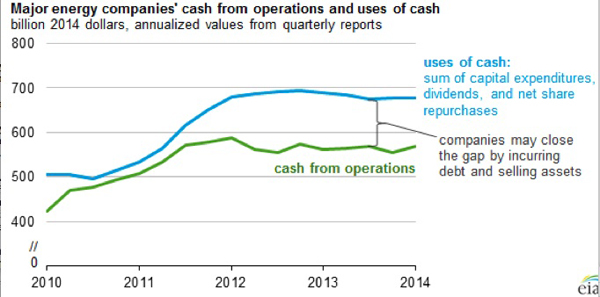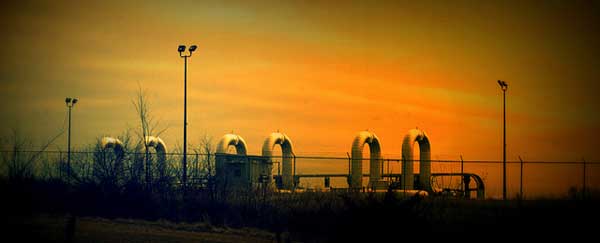Some of the summer's biggest news stories took place in the bombed schools of Gaza, the abandoned hospitals of the Democratic Republic of Congo, the wheat fields of eastern Ukraine and the bloody mountains of northern Iraq.
But one of the most important made virtually no headlines at all, and seemed to only appear on the website of the U.S. Energy Information Administration.
Last July the government agency, which has collected mundane statistics on energy matters for decades, quietly revealed that 127 of the world's largest oil and gas companies are running out of cash.
They are now spending more than they are earning. Profits have lagged as expenditures have risen. Overburdened by debt, these firms are selling assets.
The math is simple. The 127 firms generated $568 billion in cash from their operations during 2013-2014 while their expenses totalled $677 billion. To cover the difference of $110 billion, the energy giants increased their debt load or sold off assets.
Given that the gap between earned cash and spending stood at a modest $10 billion in 2010, that's a significant change for the industry as well as the global economy it fuels.
Mining messy bitumen
The Energy Information Administration doesn't explain why the world's major hydrocarbon producers are now spending more and making less. But an August report by Carbon Tracker, a non-profit financial think-tank, provides some possible answers.
Most companies are now investing in high-cost and high-risk projects to mine difficult hydrocarbons such as bitumen or shale oil, according to Carbon Tracker. Hydraulic fracturing, the land equivalent of ocean bottom trawling, adds to the cost of oil, too.
It's not only the firms deploying fracking that are racking up high debt loads. Chinese state-owned corporations, for example, plopped down $30 billion to develop junk crude in the oilsands over the last decade.
But with a few exceptions, none of the investments are making a good dollar return due to the difficult and costly nature of mining messy bitumen as well as problematic quality of the reserves, combined with huge cost overruns.

By Carbon Tracker's calculation, bitumen remains the world's most expensive hydrocarbon. The extraction of this fuel signals that business as usual is over, and mining of extreme hydrocarbons comes with extreme financial and political risks.
Cheap and easy days are over
The Chinese aren't the only ones facing diminishing returns from high-cost projects in the oilsands.
Most of the world's oil and gas firms are now pursuing extreme hydrocarbons because the cheap and easy stuff is gone. The high-carbon remainders include shale oil, oilsands, ultra deepwater oil and Arctic petroleum. (Industry now wants to frack the Northwest Territories, too.)
But given that oil demand in places like Europe, the United States and Japan is flattening or declining, many analysts don't think that high-carbon, high-risk projects (which all need a $75 to $95 market price for oil to break even) make much economic sense in a carbon-constrained world.
"Our analysis demonstrates that a blind pursuit of reserve replacement at all costs or a focus on high expenditure regardless of returns could go against improving shareholder returns," recently warned Carbon Tracker.
The capital costs for liquefied natural gas (LNG) terminals supplied by heavily fracked coal or shale fields is also rising. Highly complex LNG projects in Norway, Australia and Papua New Guinea have all experienced major cost overruns.
Goldman Sachs now reckons more than half of the oil companies listed on the stock market -- are spending five times more than what they did in 2000 chasing extreme hydrocarbons. As a consequence they need an oil price of $120 a barrel to remain cash neutral in the future.
Spending more cash to get less energy has major implications for the global economy, a creature of oil. Whenever nations spend lots on oil, they record crazy exponential growth, like China. And whenever nations spend less on petroleum, like Europe and the U.S., there is stagnation.
Oil's slavish hold
To explain oil's slavish hold on the global economy, the Russian physicists Victor Gorshkov and Anastassia M. Makarieva employ a useful metaphor.
Imagine a town of 100 people. Ten own the air, the oil of the modern economy, and they force everyone else to pay to breathe. The other 90 work hard and give the air owners about 10 per cent of their production.
Whenever the price of air goes up quickly (and the cost of extracting oil has increased substantially in the last decade -- about 12 per cent a year), then economic growth slows to a crawl. The air owners have killed the growth potential of the workers.
Sooner or later the owners of the air realize they have to lower the price. "As the air price goes down, the workers feel better.... This, in short, is the scenario of the global economic crisis, how it starts and how it develops," explains Gorshkov and Makarieva. "Curiously, none of the economic analysts relate the world crisis to the abnormally high oil prices that preceded it."
But diminished returns from extreme hydrocarbons will do more than slow down productivity and increase price volatility. They will impose lasting and material adjustments on all of us.
In addition to seeing fewer vehicles on the road (a startling U.S. reality already), we shall also see lower wages (except in the hydrocarbon industry), rising food prices, rising personal debt loads, increased demands on governments increasingly short of revenue, explosive inequalities in wealth and rising political conflict.
Our new narrative
We shall also see more of what the U.S. Energy Information Administration dutifully recorded: soaring debt loads to support massive energy sprawl. That means industry will spend more good money chasing poor quality resources. They will inefficiently mine and frack ever larger land bases at higher environmental costs for lower energy returns.
Combined with its twin brother, climate change, this is the great energy narrative that will shape our destiny in the years to come.
Marion King Hubbert, a Shell geologist, predicted this development decades ago and presented the cultural conundrum clearly: "During the last two centuries we have known nothing but an exponential growth culture, a culture so dependent upon the continuance of exponential growth for its stability that is incapable of reckoning with problems of non-growth."
But why would such a radical development be news in the dog days of summer? ![]()
Read more: Energy

















Tyee Commenting Guidelines
Comments that violate guidelines risk being deleted, and violations may result in a temporary or permanent user ban. Maintain the spirit of good conversation to stay in the discussion.
*Please note The Tyee is not a forum for spreading misinformation about COVID-19, denying its existence or minimizing its risk to public health.
Do:
Do not: